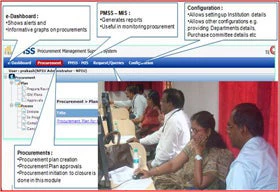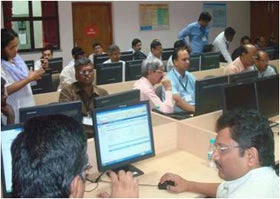
The procurement Review Consultants reported an astonishing 56% variation and resulting non compliance of procedures in the sample of reviewed contracts. A series of further assessments and introspection brought out the main issues that plagued the procurement system. These were:
(i) Geography: challenges of ensuring consistency and adherence to agreed procedures in projects that covered a wide area between hundreds of institutions as seen institutions in different states following their respective procedures , using inappropriate methods of selection, etc.

(iii) Delays: addressing timely processing of contracts which were bogged down by administrative approvals and
(iv) Monitoring: It was clear that a more efficient post award contract management and monitoring mechanism was needed to avoid cancellation and/or delays release of payments.
All these findings led the project to develop software to allow more than 200 engineering higher education institutions spread across the states to carry out procurement in an efficient and consistent manner after major issues in TEQIP Phase 1. With US$ 200 Million in procurement needs for a large project, conventional methods of issuing a Procurement manual and conducting a few training sessions were not appropriate. With the advantage of IT connectivity and technology savvy faculties in the institutes, the Procurement Management Support System or PMSS was born.


For Swati Gamaliel and Prakash Singh in the National Project Implementation Unit (NPIU) of TEQIP, life has become very hectic since the roll out of PMSS in April 2011, but without any complaints! They feel a part of a revolutionary shift in project implementation and are thrilled with the openness and transparency brought by the system. Prakash says he get calls even at 10:00PM, for clarification from engineering institutes working on procurement planning in PMSS. Swati is amazed at the enthusiasm shown by faculty members on PMSS; she finds many late night log-ins by institutes.

Prof O G Kakde, Dean and TEQIP Coordinator of VNIT, Nagpur, the first institution whose procurement plan, approved in PMSS has now successfully carried out said “PMSS procurement planning had really made all faculty members sit down and think what we needed for realizing the Institutional Development. The best part of the system is the alerts we get automatically on procurement to be initiated and other tasks”.
For more details visit www.teqip-pmss.com or write to: npiuwb@hotmail.com


Join the Conversation